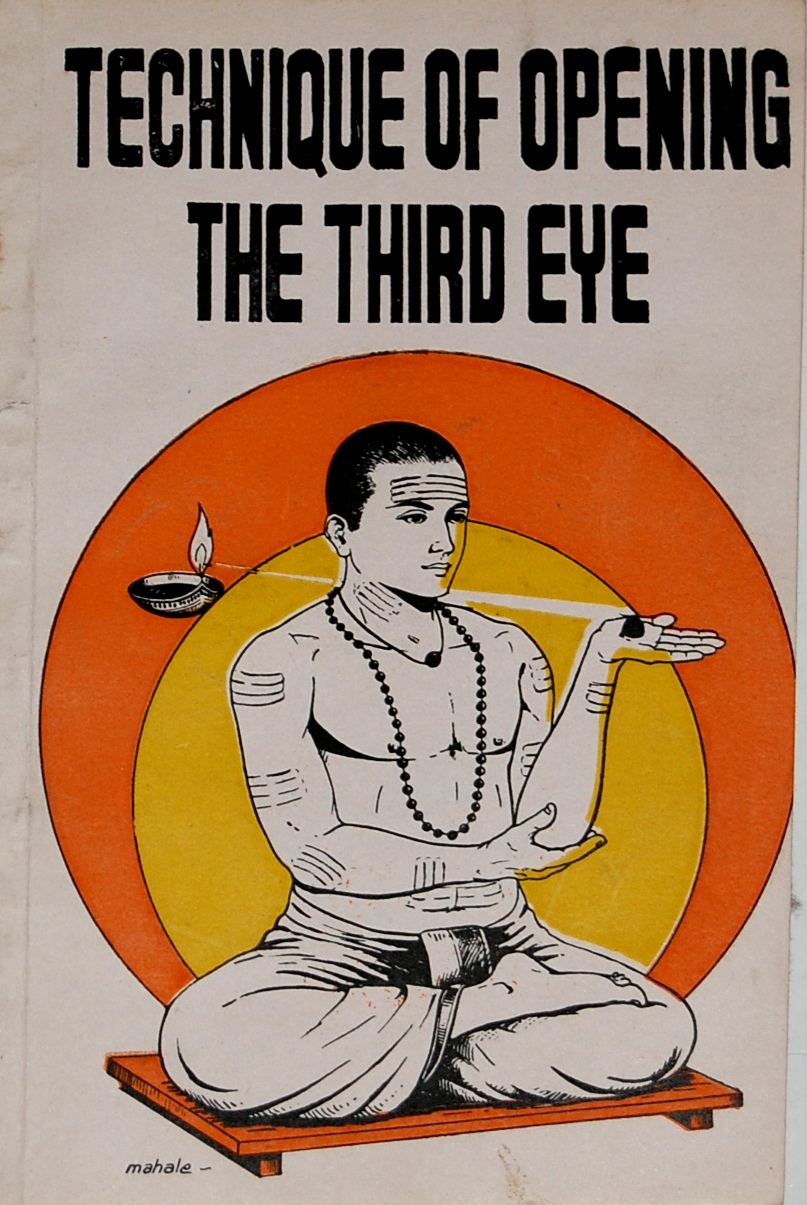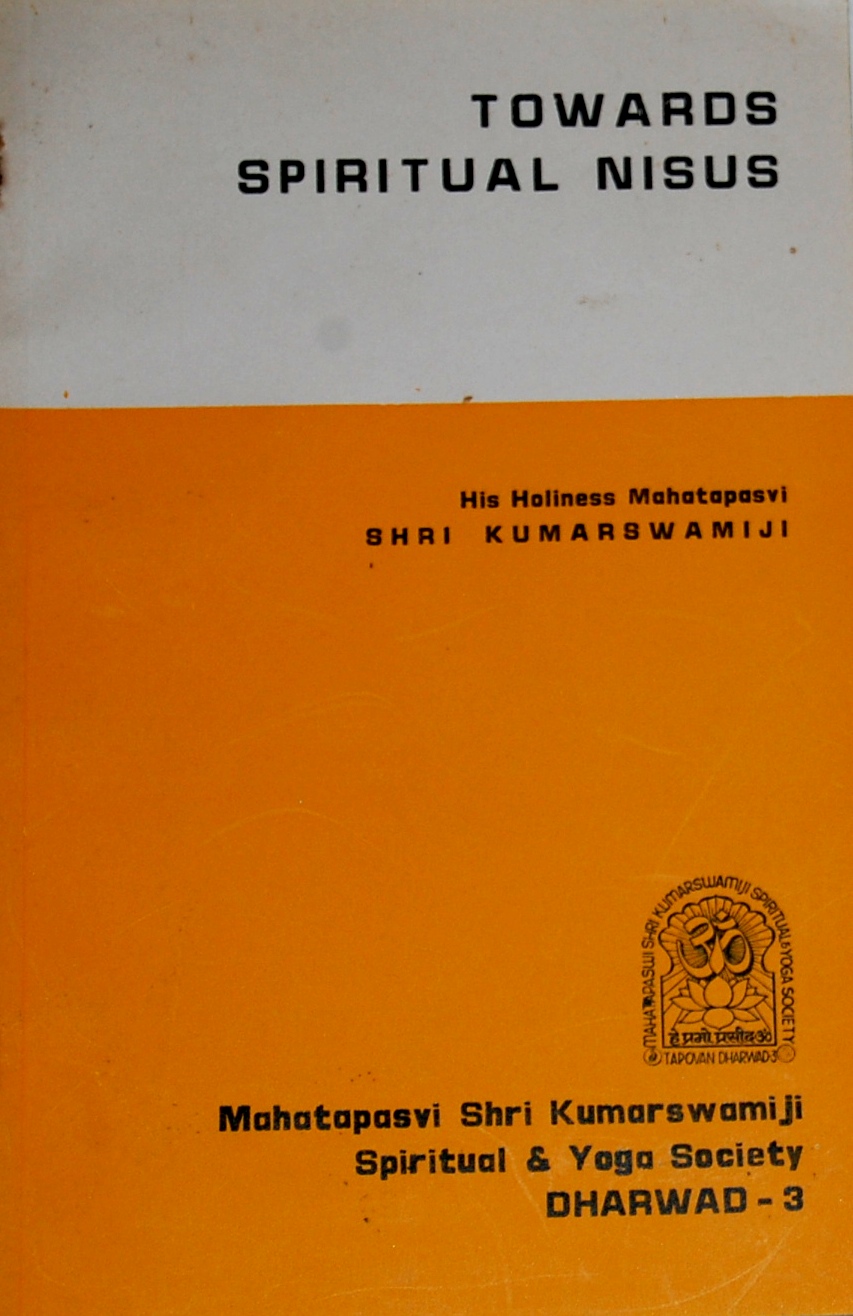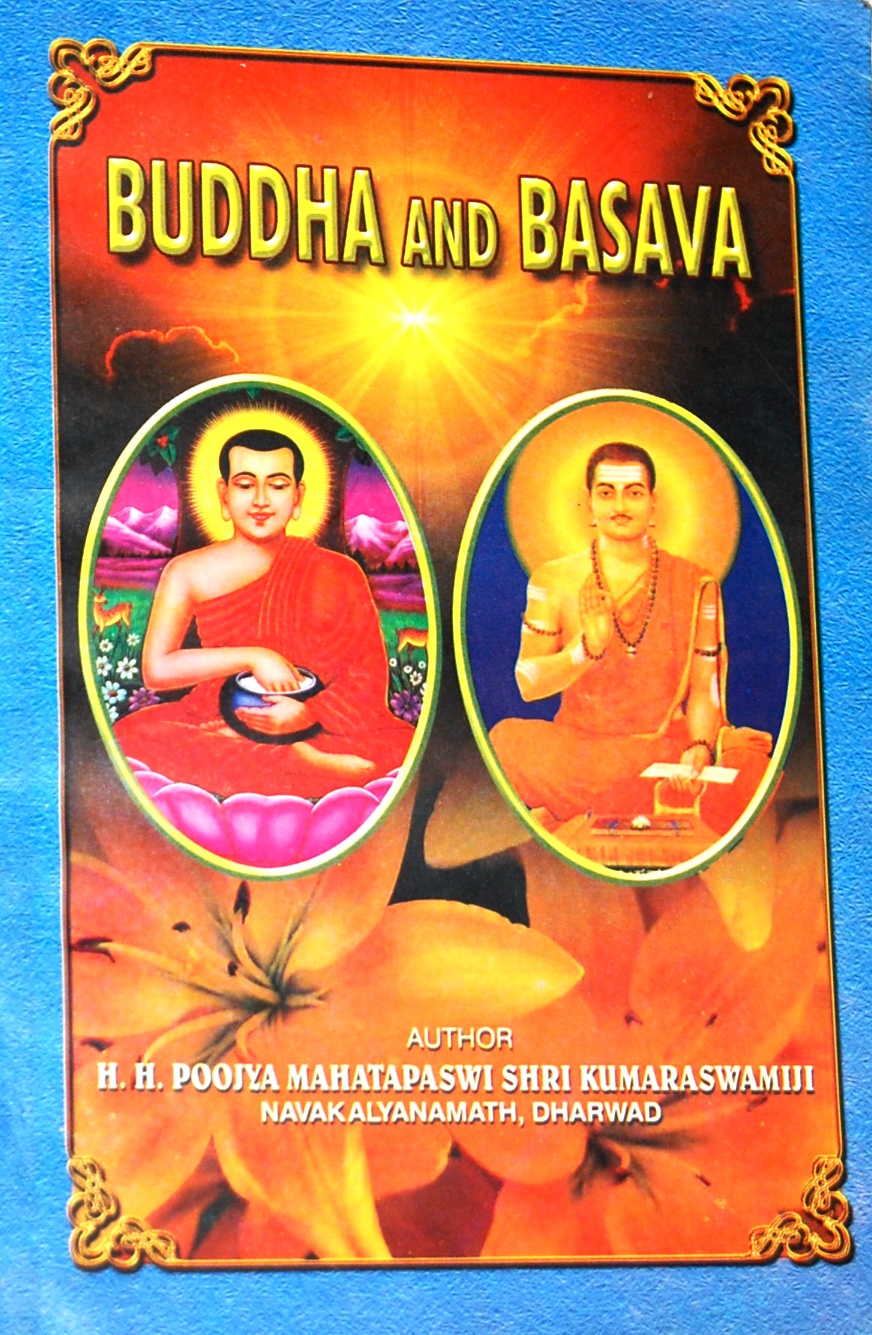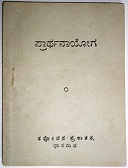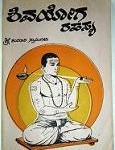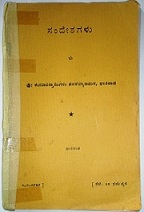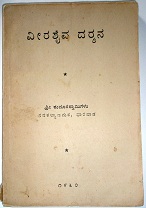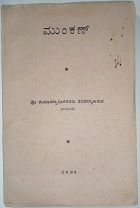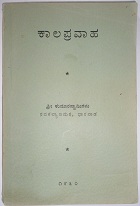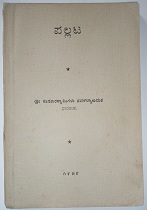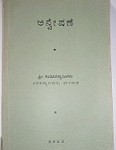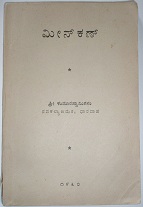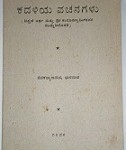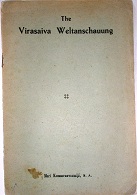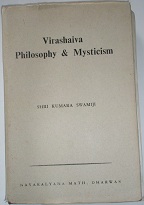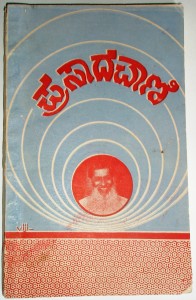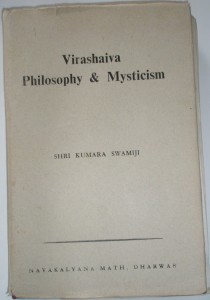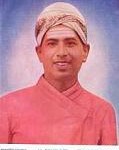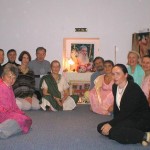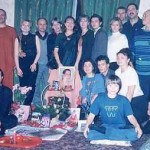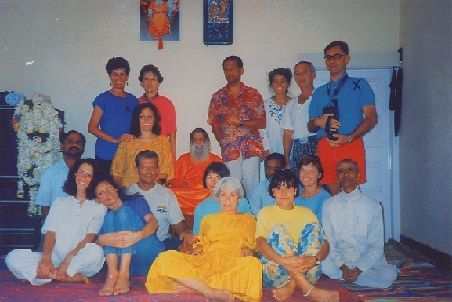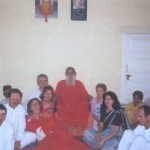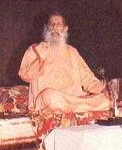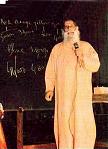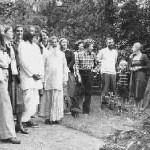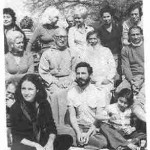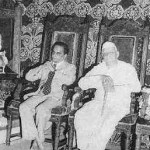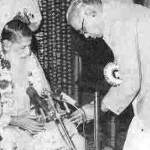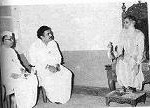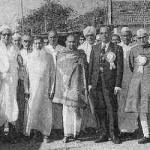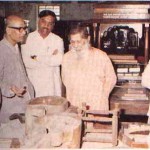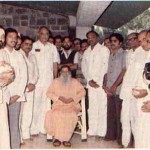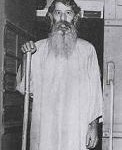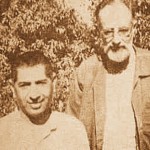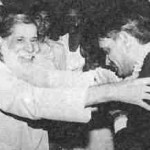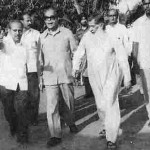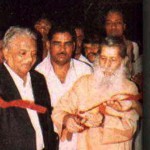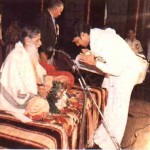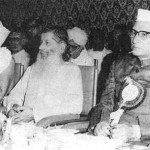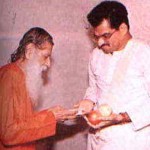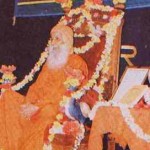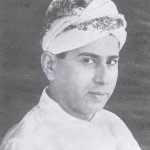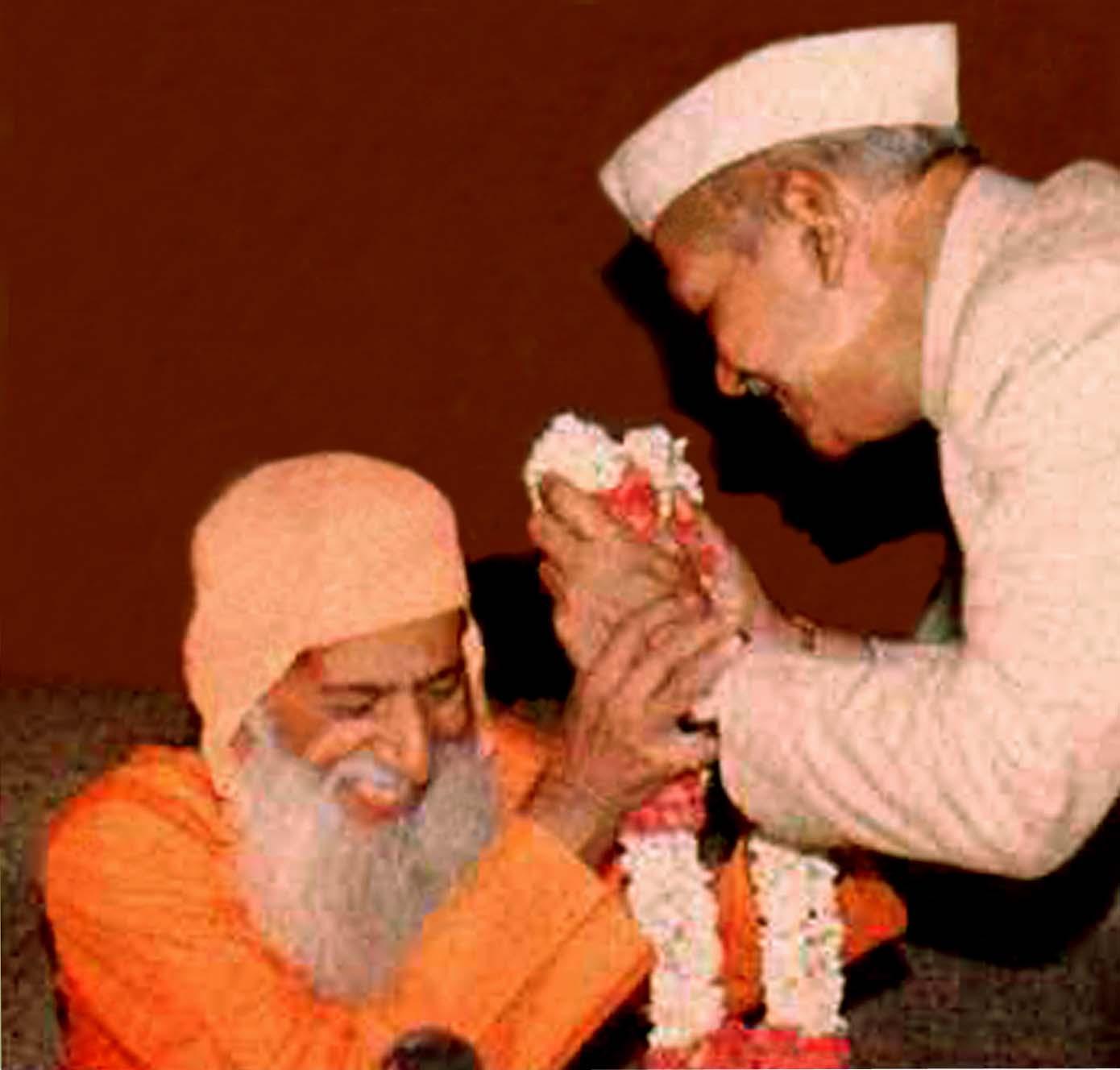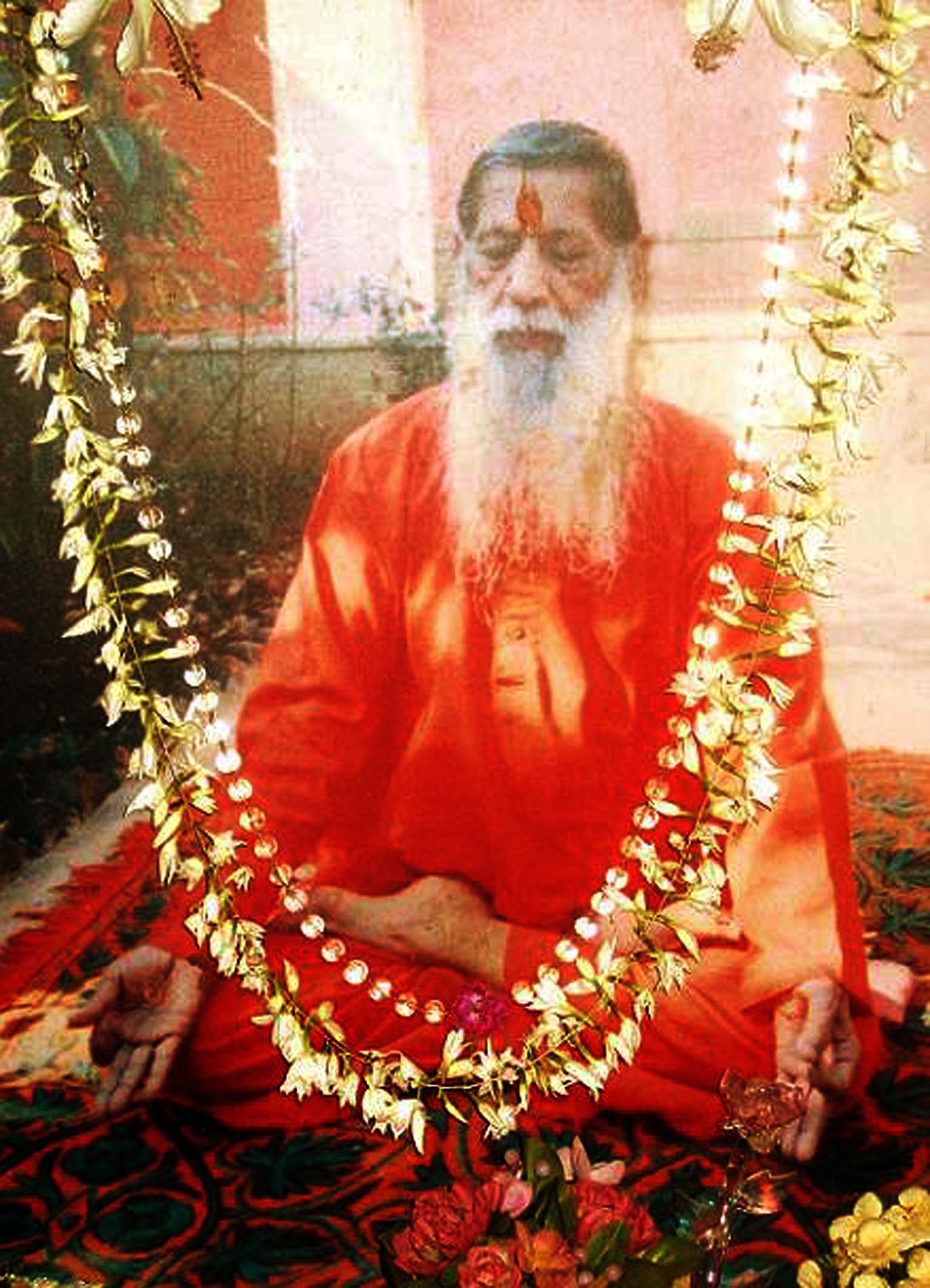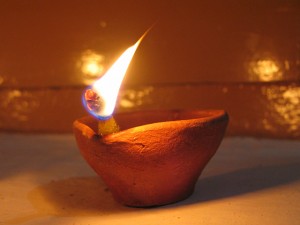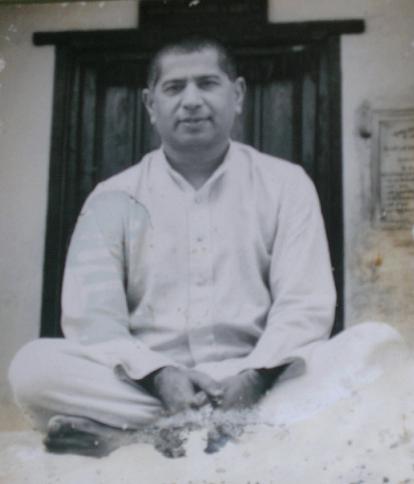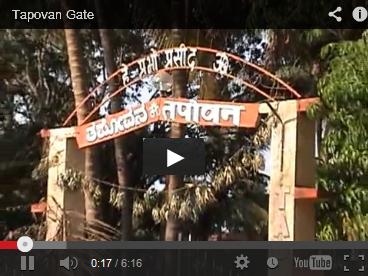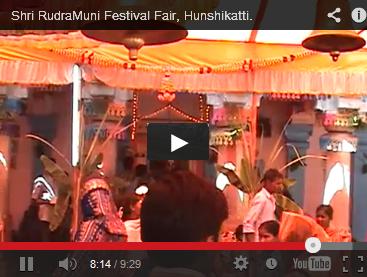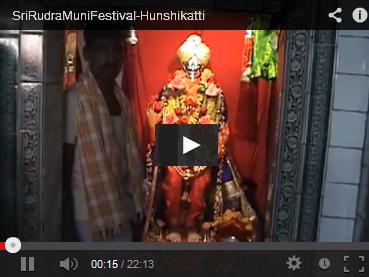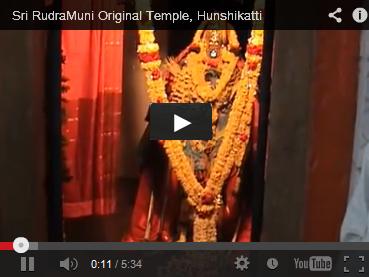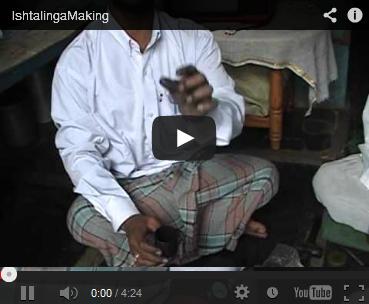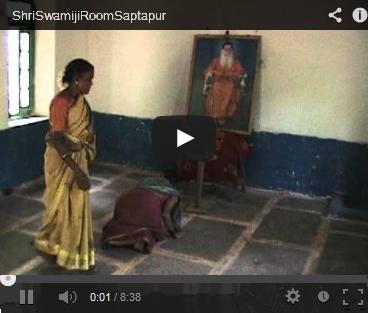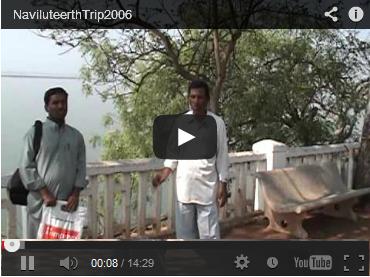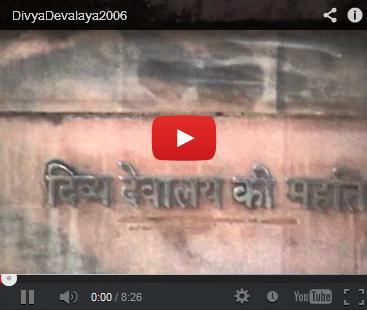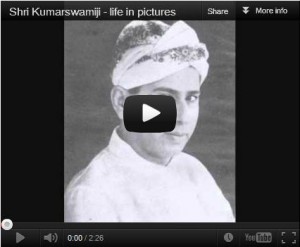Without the help of either a long rope or easy steps
Water can’t be drawn
From the deep down, nether world;
Our ancients, with the help
Of sound built steps of silence to heaven. Look, that is the way to heaven;
O Lord Kudala Channasanga,
Our sharanas lit the lamp of speech
to purify all mortal minds.
Occupying a unique place in Kannada literature, vachanas of Channabasavanna contain the cream of mystic experience. Mysticism is nothing but a harmonious blend of true knowledge and good action. He who lives in the union of Linga and Anga is a mystic. His action springs from piety and all his utterance is a chant. His speech is a priceless pearl born in the ecstasy of true devotion: a reservoir of mystic experience, and a treasure-trove of eternal truths. Therefore, the Sharanas, who longed for the everlasting instead of the ephemeral, adored and fostered the vachana literature which, they thought, was better than the Vedic lore that searched in vain for God.
Vachana Literature is the outcome of the experience of souls who had the happiness of beholding the divine light. It is the fragrant breath of many a Shivayogi, whose body was pervaded with the brightness of Linga. It is the way that leads to heaven. It is a lamp lit by the Sharanas to dispel the darkness of the mortal mind.
The very origin of Vachana Literature bears witness to its novelty and originality. The root of Vachana Literature lies in the complete and undivided bliss born of the Yogi’s absorption in the animate and inanimate nature which is to be found in the self. Channabasavanna speaks of those who say that they write in imitation of the Ancients’ Vachanas:
If, making foolishly a needle of clay,
A potter goes to sell it in the blacksmiths’ lane,
He’ll be told that only steel needles are sold there:
Without knowing Lord Kudala Channasanga’s height,
Don’t speak, you, circus animal,
As does an actor
Who, learning all by heart,
Parades his vanity.’
Can a potter’s clay-needle ever stand before a blacksmith’s steel-needle? If vachanas are to carry weight, due discipline and understanding are necessary:
Sir, can a mahut ever
Become a great emperor?
Can they who are conversant
With Veda, agama, Shastra, Purana
Become like the Ancients,
Perfect in word and deed?
Can a charming charmaid,
Dressed in costly jewellery,
Be called Goddess Gouri,
Lord Shankara’s spouse?
What if the true precepts, read and heard,
Are preached for sheer form
Without due discipline and knowledge
Resolution in word and deed?
They are doomed to stinking hell,
O Lord Kudala Channasanga!
One may be skilled in conversation
Wise in elegant recitation,
Clever in reading and writing,
Know the inner and the outer
Unthought of in the antique lore,
Like Purana, agama, Smrti
Freed from physical illusion,
May even live in Kashi, purged of passion
But without Experience of Linga,
One cannot become a favourite
Of my Lord Kudala Channasanga,
To be possessed after his desire.
Channabasavanna is never tired of praising such vachana literature full-throatedly and goes on saying:
Our ancients’ vachanas fathomed, the depth of knowledge,
Our ancients’ vachanas planted firmly the fickle mind
Susceptible to the forces of the seven sins, five senses and ten airs;
Our ancients’ vachanas transformed the physical senses into spiritual ones;
Our ancients’ vachanas occupied the peak of spiritual heights;
Our ancients’ vachanas identified all senses with two -hundred-and-sixty Lingas
Wiping out the physical form.
Knowing well its formlessness,
It stood in eternal and absolute bliss,
As our Lord Prabhu and the prominent seven hundred and seventy Amaraganas,
Innumerable ancients and the throng of Pramathas
Heard and praised such a hoard of vachanas.
Rejoicing fully in our Lord Kudala Channasanga,
They immersed themselves in Linga.
Not stopping here, he proclaims loudly:
Hark! Hark! the advice of the ancients’ vachanas!
Listening to the advice of the vachanas
Of our Kudala Channasanga’s sharanas,
Purged of all deadly sins,
They are absorbed in Linga!
At the sight of those who reject the preaching of vachanas which is a veritable life water, Channabasavanna pities them:
As a goat, tasting not the juice of the sugarcane,
Is content to chew the mere leaves,
Leaving the inward essential juice,
Stirring the earthly physical water,
Wearily wandering human lambs
Look like fools who oddly prefer
A brittle glass to a precious gem!
One who drinks the pristine pure nectar of vachana needs nothing else.
Wallowing in the milky sea,
He hankers not after the cow on the bank;
Possessing the alchemic stone mountain,
He does not gather the street dust,
In order to earn his daily wage.
The happy one who sports, in the milky sea,
Builds no tanks, no shady banks,
Neither jumps in nor drinks from
Artificial, narrow wells.
What a difference there is between those whose lives are refined interiorly and those who are refined exteriorly!
Does physical purification,
Without life’s sanctification
Tear the screen of illusion?
The habit of disguise
Causes nothing but soul’s eclipse.
Can the life bondage break
Unless knowledge dawns on him?
Behold the stack of abundant growth
That grew unsown, unglown.
How, at very birth,
Its perfume is so like a ball of scent!
Before beginning was or the Unbegun,
Himself He was. So, with no manner of touch,
Channabasavanna, gaining the grace,
Himself became the Linga, that He might show me
Both goal and way, assumed this form
In Lord Kudala Sangama!
As Basavanna says in the above vachana, Channabasavanna was by birth an embodiment of knowledge. His perfume has pervaded all his vachanas. Luminous as he was with the great psychic light, treading the path: of the Sat-sthala, attaining psychic knowledge at the Bhakta stage, possessing the awareness of sound at the Mahesha stage, obtaining absolute knowledge at the Prasadi stage, gaining the knowledge of salvation at the Pranalingi stage, he stopped at the Sharana stage, imbibing the knowledge and gaining the experience of all stages, and thus became the sovereign monarch of the Sat-sthala. Once Channabasavanna got the enlightenment, he saw the vast gulf between himself and the sinful world around him:
When I am pure and bright,
Why the stain of birth on me?
Why did I come to destroy the world?
Why did I come to tear the leaves of the tree of life?
Why did I come to sit amidst men and sing to all?
Why these two words
Channa-basavanna to me?
Doesn’t be who has to gather the fruits of life, look as if he came to chop the tree of life? Doesn’t he who enjoys then look as if he came to eat up the whole world? As a representative of the entire humanity, Channabasavanna feels the pain:
My physical property looks like
A floor made with a mouse inside.
Why all the preachings of pride?
You, Father Linga, only to afflict me,
Put desire, anger, avarice, attachment,
Pride and jealousy into me!
Removing all earthly diseases,
Vouchsafe your grace of salvation,
Lord Kudala Channasanga!
As Channabasavanna prays, his varied emotions have found poetic expression. His struggle and interior pain can be felt through the lines. But, once be finds divine strength, he is ever ready for the immense task of sanctifying the world. No more does he fear or flinch:
My teacher’s initiation is not like others’.
None does he bless, unless
One is pure in word and deed.
No unregenerate men does he accept
Unless meant for spiritual salvation.
He doesn’t look at them
Who groan under life’s burden!
‘Thanks to your kind advice, I swear by Lord Kudala Channasanga, I prove myself praiseworthy before the great saints of the mortal world’. Thus he goes ahead in fulfilling his mission.
The path of devotion is not an easy one to negotiate. Lord Hara tests his devotees by screening and cutting. Should he find him to his liking, be will test him in all possible ways. ‘Ibis is evident from the lives of saints.
Channabasavanna is great both as a saint and as a literary figure. The quality of literature is gauged by the quality of expression of the poet’s experience. The expression should be adequate or at least nearest, to the experience. Channabasavanna as a mystic has experienced the Good, the Beautiful and the eternal Truth itself. Such experiences are generally beyond words. They can be felt, lived but cannot be easily communicated. According to the saying of the Upanishad, ‘Yatrovaco nivartante aprapya manasasaha’, that is to say, mystic visions are indescribable. That is why, Sarvajna has said ‘Keep quiet if you have seen Him’, for the infinite defies the laws of the finite.
There are, however, a large number of people who are endowed with a great capacity for expression. These are all great poets. They express the inexpressible, and, therefore, are known as creative minds. The chief aim of literature is aesthetic pleasure. That literature which fails in providing this is no literature at all. Hence mystic poets have to communicate their experiences in such a way that the latter become a source of pleasure to the reader. Only then can they be classified as literature. If we read the vachanas of Channabasavanna we come to know the height of his experience and its high literary value.
The Sat-sthala is, first and foremost, the experience of a pilgrim marching towards his God. Though many have trodden this path, the experiences of them all are not the same. Experience is personal; so also is the expression of the experience. When we scrutinise vachanas of Channabasavanna we realise the depth of his experience and the height of his vision. If poetry is a reflection of a personality, Channabasavanna stands head and shoulders above most saints as a poet.
His vachanas are pregnant with rich mystic experiences of the Sat-sthala. ‘Poetry’, as Wordsworth says, is the spontaneous overflow of powerful feelings’. These feelings may find different expression following the intensity of the experience. If the experiences expressed in poetry are of this world, many can share them and find pleasure in them. Such literature is both vast and popular. There is, however, another type of literature where mystical experiences are expressed. These experiences are beyond our senses. Hence, only a few can find pleasure in them. For this reason, mystic poetry does rot cease to be poetry, for it, too, is the spontaneous overflow of powerful feelings recollected in tranquillity. Since mystic poetry is beyond the common man’s experience, it is slight in bulk. It is, how: ever, great in quality, since, this experience is higher than sensory experience. As a fountain of water assumes the colours of the rainbow, so do the experiences of these sharanas reflect colourful souls. Channabasavanna’s vachanas are a standing proof of this.
Channabasavanna may be compared to a swan, if we imagine the Sat-sthala as a lake, for be can move freely in that vast expanse of experience, regardless of its depth. His explanation of the Sat-sthala is the most lucid of all.
According to Veerashaivism, there is a state of mind in Parabrahma in which His memory fails and consequently he forgets his true nature. That state of mind is called variously: the Natural, the Absolute, the Infinite etc. Before he comes to that state of forgetfulness, the eternally dwelling Shakti in Him brings about creation. Creation, therefore, is the externalisation of Shiva’s Shakti. Creation, for Shiva, is a becoming. Hence, in creation, He is created; outside it, He is the uncreated. In sport, he is Umapati; when the sport stops, he is ‘svayambhu’. This is the basic metaphysical principle of Veerashaiva philosophy. Channabasavanna expresses this beautifully in the following vachana:
From where did the spider bring the thread
To weave a web around?
No spinning-wheel, no cotton ball.
Just as the spider sports and departs,
Shrouding himself in the self-spun yarn,
Which he finally swallows himself,
Merging into Himself the cosmos
Created by Himself for His own sport,
Lord Kudala Channasagna
Became one with the absolute.
Here we must note the art of explaining philosophical truths with the help of the imagination, a characteristic of Channabasavanna.
The Ishtalinga is the mirror and the Pranalinga the reflection.
If the mirror becomes blurred, how can the reflection be seen?
In this vachana, Channabasavanna has explained in a picturesque manner the nature of Ishtalinga. The Supreme Self dwells beyond Bhava in the individual. Since Bhava is one of the states of the mind, like Prana and Ishta, the Supreme is adored in all three. As Ishtalinga reflects Pranalinga, we should see the latter while we worship the former. In order to drive home this truth, Channabasavanna has employed, in the vachana quoted above, the imagery of a mirror. We should keep the mirror clean, undamaged and without a scratch on it, if we want to get a clear reflection; so too, in the case of Ishtalinga, the clearer is the mirror of Ishta, the clearer is the reflection of Prana. Thus through an image, Channabasavanna has expressed a most profound truth.
Another fundamental principle of Veerashaiva philosophy is immutability. Creation, as we have seen, is Shiva’s becoming.
In this action, He remains what He is. As a piece of gold may take any shape without changing its nature, so is Parashiva. Note the manner in which Channabasavanna expounds this truth:
Can ever golden ornaments, Like anklets and coronets, Be other than gold itself? Can ever the five elements, That have come out of God, Including the sky itself, Be other than God Himself?
Though these five elements are not substantially different from the Supreme Self, who has forgotten their true nature, in order to restore this knowledge, the veil of ignorance must be removed. Channabasavanna has expressed this idea again through an image:
There has spread the moss of ignorance
On the ocean of knowledge sweet as nectar;
It will not recide unless pushed back
By him who wishes to drink water,
Nor does it cease to spread again.
Such examples, taken from everyday experience, enable even the common man to understand deep realities.
The Guru, the Linga and the Jangama are a sine qua nou for Veerashaivism. These contain in themselves the whole of Veerashaiva philosophy. The Guru, the Linga, and the Jangama represent the existence, the consciousness and the bliss of the Supreme Being respectively. These three phenomena, therefore, are normally the three aspects of the Supreme Spirit. This profound truth is expressed by Channabasavanna in a simple manner as in the following vachanas:
As water freezes into hailstone
And liquid ghee into solid ghee,
The great Linga, the Supreme Light divine
Transforms Itself for the good of the world
Into Guru, Linga and Jangama.
Another simile to the same effect may be noted:
As a small seed contains a big tree,
As a glass on the palm shows the images of elephants and mountains,
The Supreme Shivalinga, with a noble desire to redeem all his true votaries,
Has come to assume the form of Linga.
Thus, Channabasavanna explains one and the same idea in more than one way, in order to drive it home. The Guru, the Linga and the Jangama are, as we have seen, incarnations of the three powers of Parashiva. The salvation of the world is the purpose of these incarnations. That is why the first step on the pilgrim’s path of Slat-sthala is the initiation ceremony of Linga conducted by the Guru. The devotee cannot proceed on the path of Sat-sthala without the Linga, for it is essential for Anga, being the manifestation of the consciousness of Shiva. It is the key to self-revelation. One cannot miss the charm of the vachana in which Channabasavanna speaks of the necessity of Ishtalinga.
A kite in the sky needs a string.
……………………………………………………
How can a cart go without the road?
Can the Anga do without the company of Linga?
The above example of ‘kite and string’, is a matter of common experience. Though a kite can fly high up in the sky, it still needs a guiding string. Similarly, the soul set for a spiritual odyssey does require the Ishtalinga, without which it will wander and fail to reach the goal. One may have acquired all the knowledge about salvation, but, if one does not take the necessary steps, it is of no avail. If a soldier full of valour takes to violence, can he hope for victory? In the same vein, if a devotee, though full of earnestness, fails to worship the Ishtalinga he cannot attain liberation or salvation. Just as the bard ground is essential for the cart to move on, so also is the Ishtalinga needed for the Anga to move towards salvation. Thus the necessity of Ishtalinga is made obvious even to the ignorant man.
Without initiation by a Guru, a devotee cannot have the Ishtalinga and without the Ishtalinga he cannot attain salvation. Therefore he must attain salvation only through his Guru. Channabasavanna explains this as follows:
“At the touch of the Guru-bull
The devotee-cow becomes the mother,
The Linga is the calf, the body is the udder,
The mind itself is pure milk.”
‘Significant is the initiation by Guru.
What if a bullock is born of a cow?
He is not Basava without Linga’s stamp.
What if an embryo grows in a Jangama’s womb?
He is not Jangama without initiation.
If he goes to gargle water
Without initiation among devotees,
It’s like a stray dog’s pissing on a tree trunk!”
“Can calves born of a street bull
And stray cattle become Basavas,
Unless they receive Linga’s stamp?
The devotees’ children can’t become devotees
Unless the Guru bestows the Linga on them.”
The children of a Jangama are not Jangamas. Jangamahood should come to them through initiation. A bullock born of a cow cannot become Basava without the stamp of Linga. Similarly, without initiation, the embryo of a Jangama can never become a Jangama. This single example is sufficient to show the poet’s wealth of experience and observation. His simile, showing the harmonious relationship between the initia?ting Guru and the receiving Devotee, is worth nothing:
The Guru and the disciple should be
Like light hidden in light,
Like an image hidden in a mirror,
Like a pearl hidden in a crystal cube,
Like the heart of body’s shadow
Like holding mirror to mirror.
The similes indicate the hierarchical relationship of the Guru and the devotee. The preaching of the Guru on Ishtalinga arouses the Conscious Force hidden in the heart of the devotee; it is like light striking light. Now their relationship is like a light bidden in Light. The following comparisons express the harmony that should exist between a Bhakta and a Jangama.
The harmony between the Bhakta and the Jangama should be invisible and hidden from the world: Like the trackless path of fishes and whales Like the dream of a small child, Like the taste o f a dumb man.
Neither the giver nor the receiver should make a display of their action. Their action should be hidden from the eyes of the world and done in silence. The similes-‘the path of a fish’, ‘the dream of a child, ‘the taste of the dumb’-are quite apt. Fishes move in water, but they leave no trace of their track behind. The dream of a child and the taste of the dumb are felt but not expressed. The more we reflect on these examples the more we shall relish them.
The purpose of the worship of Guru, Linga and Jangama is to bring about the desired union between Anga and Linga. This union saves the devotee from death; he becomes immortal. This truth is conveyed poetically by Channabasavanna:
Sir, can a white ant eat a diamond?
Sir, can a serpent sting a bag of gunpowder?
Sir, can a dog sleep on a burning oven?
The poetic beauty underlying these illustrations cannot be questioned. Below the poet explains ‘The communion with Linga’ by a comparison all his own:
As gold doesn’t know its value
And jaggery its sweetness,
As stone lies hidden in warer,
And fragrance in a flower,
As camphor is concealed in fire,
So is he who is in Mahalinga,
Knowing not, identified with Linga.
From the above considerations, we see that Channabasavanna, thanks to his poetic genius, could bring down to earth the truths which are beyond the reach of the common man. His keen observation of the world around him was a great asset. He could give a chain of illustrations from our humdrum life in. order to bring philosophical truths of the experiential level, which is the true function of any poetry. The spiritual message, coupled with poetic fancy and humour, has raised the poetic value of Channabasavanna’s vachanas. This does not mean that the poet in him has succeeded always in bringing the mystic experiences to the level of ordinary sensory experience. Some of his vachanas are prosaic. The chief characteristic of his style is clarity achieved through the similes which are within the easy reach of the common man. A few more vachanas may be given as illustrations. His mastery over language and the richness of his imagination may be noted here:
Sir, how can the earth-bound creatures know the Light of your true conduct?
Look, this is the observation of the world:
Sir, how can a lamb taste sugarcane juice?
Does a dog know the bounteous tree
That grants all that one desires?
Can a boar know the wishing cow?
Does a donkey know the wishing gem?
Does a fox know the philosopher’s stone?
Does a crow know the divine ambrosia?
Can the blind see the marvel of images?
Do the deaf know the primal sound
Om and other ten sounds?
Does a eunuch know the pleasures of love?
Does a charmaid know the royal pleasures?
Can the coward know valour in battle?
How can the poor possess pearls?
Does a dunce know the power of poetry?
How can the lustful know the pleasures of meeting with Shiva?
Does a patient relish plantain juice?
Can an owl know the light of the resplendent sun?
Therefore, according to worldly observation,
How can the mortals who, owing to
Passions born of the eight desires,
Are writhing in excretions,
Like, gold, clay, woman, food,
Water, wood, jewellery, vehicle,
Know the wealth of Sarvachara
And the greatness of the meeting
With Shiva, the Supreme King of true bliss,
O Lord Kudalachannasanga?
Any number of illustrations seem insufficient for Channabasavanna to convince us that mortals cannot know the greatness of Shivayoga. The poet has intuited the greatness of Shivayoga. He wants to communicate it to the reader as fully as he can.
One should read the following vachana along with those quoted above:
What if a crane stays many days with a swan,
Can he ever become holy?
What if a bard stone lies in the Ganga,
Can it ever become soft?
What if a dry wood lies long with the wishing tree,
Can it sprout to bear fruit?
What if a bitch lives at holy ‘Kashi’
Can her milk become ‘Panchamrta’?
What if an ass lives in a holy lake,
Can he ever become great?
What if a piece of charcoal lies in a
large measure of milk,
Can it ever become white?
Therefore, what if an unrighteous person lies
At the feet of Lord Kudala Channasanga’s Sharanas
Can he ever become a righteous devotee?
They show the poet’s inner urge. He has stuffed the pithy sayings with a wealth of meaning which rises far above the grasp of many. The poet has suggested his meaning. He now wants to admonish us. He says that the frankness of the Sharanas demands readiness to accept their teaching. He has his own way of expressing it:
When the lightning comes,
We should be ready to use it for our experiment.
And we should lose no time to make use
Of the rainbow when it shines in the sky.
Wasting no time, all at once
We must use the mystic speech
When the mystics talk with an open mind.
Self-will’d are the Sharanas
Who are one with Lord Kudalachannasanga.
Channabasavanna had a keen social consciousness. He has criticised the social vices and the false prophets. At the bottom of the criticism, we find a compassionate heart. His noble desire was to transform this valley of tears into a garden of delight. Thus the social evils so rampant in his days have aroused his feelings:
If the alchemic stone touches a dog of iron
Will it turn into alchemic dog?
At best it will be a golden dog.
If you try to convert a man of the world
Into a devotee of Shiva,
Only the change of dress can be seen in him
But not of his heart and soul.
So, O Lord Kudal Channasanga,
Do you expect me to regard
The anointed worldlings as true devotees?
Thus, the poet has slashed the false prophets. Even his hardest thoughts get a poetic tinge “Can those be real prophets who make a living by talking about their experience of Guru, Linga, Jangama, Padodaka and Prasada any more than an infamous nameless person deserves the throne simply for bearing the name of a King? ” A pretender is an unknown person who is named after a king. Those who make a living out of propaganda of their (false) spiritual experiences do not deserve I to be called prophets except in names. They are as useless as the teats on a goat’s neck. They live like foxes who subsist on the left-overs of the tiger’s booty. The prophet’s holy anger finds poetic fulmination:
What if an … becomes a bhakta,
Can it give up eating dirt?
What if a cat becomes a bhakta,
Can it stop eating rats?
What if a pig becomes a bhakta,
Will it not eat night-soil?
What if a dog becomes a bhakta,
Can it stop eating stale meat?
Though much of Channabasavanna’s poetry is didactic, yet it never becomes a dry sermon. One who reads the following ; vachanas may desire to read them again and again for their wisdom and delight.
What if a tick clings to the udder
Does it know the taste of milk?
What if a bug hugs the body,
Does it ever know the pleasures
Springing from feminine company?
However tall a mule be,
Can it ever become a horse?
Why, to the lustful, talks of truth?
Why, to the worldlings, Shiva’s company?
Why, to an owl, an emerald temple?
Could a landlord’s charmaid ever
Dare to swear by her husband?
Can men of loose conduct,
Who descend to deep bell,
Worshipping all low deities,
Imbibe Shiva’s discipline?
Thus, the entire animal kingdom, including tick, bug. dog, rat and fox serves to illustrate a spiritual truth. By bringing them to literature, he comes close to the reader and the poetry becomes meaningful. He exhibits his immense knowledge of the habitual activities of animals and insects and their characteristic mode of behaviour. In these details, his acute power of observation may be noted. With deep concern, the poet has explained how these ignorant mortal creatures claim this world as theirs:
Just as a sparrow foolishly
Thinks the nest of his neighbour to be his,
The fool thinks that all gold
Woman and land are his.
The foolish sparrow looks quite charming when we read the vachana. Channabasavanna has made use of the vegetative and animal kingdom as media for communicating his mystic experiences. This endeavour has resulted in poetry.
Channabasavanna in describing the duration found among the elite as well as the rank and file, gives a picture of a cross section of his society:
A king’s devotion was doom’d through pride,
A village watchman’s was lost in the tip of his sword
A merchant’s in the neck of a measure
A goldsmith’s melted in an oven,
A puritan’s drowned in deep doubts,
A magician’s in shivering fright,
A vow-keeper’s in the business of life.
Here Channabasavanna paints the porter, the merchant, the goldsmith and others from their own perspective, and analyses all their works and thoughts:
A charmaid’s friendship
Sets one to fetch water and carry dust and dung;
Friendship with a harlot
Makes one eat orts.
Thus he has severely censured the great sinners who seek the company of women other than their wives. We can see a number of proverbial sayings that have crept into his vachanas:
What if you pour sweet water,
Can you make the banyan sweet?
What if you anoint onion with musk
Can you remove its nauseating smell?
What if you squeeze a raw fruit,
Can its juice match that of a ripe one?
From these vachanas it becomes clear that the poet has lived close to nature. He uses all the usages, idioms and pithy sayings of his times. Hence, what strikes one in his writing is the native element.
Falsehood sprouted in an untouchable;
It grew two leaves in a cobbler,
Four leaves in a shoe-maker
Six leaves in a washerman,
And eight leaves in a merchant;
It grew into a plant in an adulterer It grew into a tree in a drunkard,
And into a massive tree in a gambler; It blossomed in an acrobat
And bore fruit in a goldsmith; While growing ripe in a harlot,
It reached the dropping point in a king.
This one vachana is more than enough to make us understand the force of Channabasavanna’s language. His visualizing power follows the growing plant at its various stages and tastes its fruit. Meanwhile, he has succeeded in analysing various characters. If suggestiveness is the hallmark of poetry, Channabasavanna’s has a definite place in the domain of poetry. His vachanas, which contain minute observation of life deserve a place in the portals of world literature.
‘An ant knows the quality of sweet’; ‘a hen has the sense of time’; ‘a crow has the sense of caste’; ‘a harlot knows the use of manners’; ‘a learned one knows the use of satire’; ‘a snake charmer knows the use of herbs’, ‘if one wears a devotee’s garb, one deserves only food but not Linga; ‘can you find out the type of wood in fire where the fuel of different kinds is burnt?’ These and a hoard of similar vachanas are a mine of proverbial sayings.
Since Channabasavanna’s chief aim was to correct social evils, his vigilant eyes are focused on several of them:
People say that water cleanses the world’s impurity;
Then what can purify water?
By mantric words it becomes pure.
What kind of a Jangama is he
Who wanders with Linga on him
Like crores of vachanas being tied to a tree?
He is no Jangama at all.
Look, how the dogs bark
As freely as they like,
Boasting before all people,
Calling themselve true Prasadis.
Does our Lord Kudala Channasanga Like those greedy dogs who do
As the herd from a famine-hit land, Who waiting always for a second helping,
Asks for more and more food And waste all, eating little.
Since the building up of a better society was his mission, Channabasavanna had to remove all unhealthy social elements. Satire was the best means for this. Hence, we find many satirical vachanas.
On the one hand, the poet looks gloomy when he observes the miserable condition of his society, on the other, he beams with cheerfulness when he meets a few gems of humanity, like the Sharanas.
What more remains there
When speech spits out the swallowed ruby,
Light spits out hidden darkness
And the servant spits out his master whom he has devoured?
There is in this communion
Sorrow without pain,
Meeting without resisting,
And rising without setting.
Channabasavanna has expressed here his experience of being united with God. As a poet, he has used metaphors and through them suggested his mystic experience. No more ‘I and He’, but ‘I in Him’. It is an indivisible unity. To express his thought he has used several metaphors:
When gross darkness dwells in the mind,
How can a curtain conceal it?
If one steals the golden mountain
And tries to hide it under the earth,
Can it remain undetected?
O Kudala Channasanga’s devotee,
Can you hide the bliss born
Of merging in our Lord’ Prabhu?
One who has achieved this union with God is ever happy;
and his happiness cannot be hidden:
My daily worship consists of The offering of a fresh flower
And the waiving of a burning lamp,
Before its beauty fades away
And its halo is blurred
And its flame is put out.
Learning, at the time of dinner,
The inner wish of the Linga
I offer daily dish
Made of the milk of Meru cow
O Kudala Channasanga Lord!
We see the poet here soaring like a lark and singing to his heart’s content, for his soul has found its abode. Poetry cannot do without imagery. But its success depends in using it in a manner to bring out the depth of meaning. Let us see the following vachana:
Basava himself is an archer
With an arrow of fresh devotion.
He aimed a shot straight at Linga,
Which, piercing the womb of a child,
Revealed visions of new worlds;
The hunter Basava approached
‘The child Kudala Channasanga,
And, bathing him in sacred ash,
Worshipped the Linga with devotion.
Through this simple imagery of a bowman, the poet has succeeded in carrying his message across. His Guru, Basavanna, is the archer. He used the devotion of his disciple as an arrow and aimed it at Linga, that was within the disciple. Being a tender child, the disciple was pained. But the vision of new spiritual horizon was worth the pain. In order to cure the wound, the teacher applied holy ashes to the wound. This vachana illustrates the relationship of the poet and his Guru. He uses another set of similes to the same effect:
To the bow of conduct is tied
The string of right thought;
By treading on the bow of equality,
He produced a clang of harmony;
When fixing the arrow of disciple,
The Master Hunter aimed a shot
Straight at the absolute Linga.
It merged into the Linga, tail and all,
Without leaving any mark outside.
Is it possible to find both
The arrow and the target in you,
O Kudala Channasanga Lord?
The poet uses a number of images to express one and the same idea:
Look, the body is Shiva’s abode.
The navel is His lotus seat,
The Lord of Life who is riding knowledge
Is the God there?
There are nine attendants,
The master is the Lord of the Swan,
Forsaking his duties of
Worshipping the temple God,
He merged in the Linga itself.
O Kudala Channasanga Lord,
Being one with Himself
He is now carefree.
Channabasavanna has never failed to give us descriptions of Sharanas whom he had met. The simplicity of his style may be observed here. His keea observation and his power of seeing through things are evidenced here:
Dressed in the cloak of equality,
With the cap of conscience on,
Stepping into the shoes of passion,
Without falling into the pit of darkness,
Without being stung by the scorpion of pride,
Without stumbling over the log
Of renunciation on the way,
Asking earnestly for alms,
Basavanna came to Kappadi,
O Lord Kudala Channasanga.
In this vachana, the poet paints a picture of Basava’s personality. In another place, he draws a portrait of Molige Marayy’s life:
Cutting the trees of hunger, thirst
And passion with the axe of pleasure
Heaped together, chopping all
Pride, desire, anger, greed,
And lust and jealousy;
Clearing the plants of the five senses,
Six sins, seven elements,
And eight kinds of insolence,
He started with the bundle of
Seven bonds on his back,
Riding the horse of lust, desire, jealousy,
This great man chased
The cattle of anxiety.
Thus, as we have seen, Channabasavanna has succeeded in bringing down mystical experience to the level of poetic experience and thereby, making comprehensible what is incompressible and visible what is invisible. We have also seen the rich imagery in his poetry which is always suggestive. Suggestivity is considered the highest quality of poetry. Channabasavanna has succeeded in imparting it to his vachanas. A few more illustrations of this quality may be added here:
1. Sharanas should be like sandalwood, put in to a mill.
2. The Guru should be a goldsmith.
3. The devotee should be a merchant.
4. If the infinite Void becomes solid, where will be Heaven and Hell?
5. If all the clouds become pearls, from where will the oceans get water?
6. Should not the heart apprehend, even if the eye fails?
7. Don’t stir the pot containing poison.
8. It’s like making the floor with a mouse inside.
9. He will not be pleased with those fools who, standing under the shadow of Mount Meru, search for their own shadows.
10. Corn may bloat, but not the taste.
11. The Jangama should walk without legs.
12. The devotee should work without hands.
The vachana literature has its basis in the life of ordinary men. It uses the language of the common man. It is not strange therefore that Channabasavanna has made use of several phrases and idioms of the common man.
“What if the image of the moon
Is seen in a pool of urine?
Is the moon to be found there?
What if the body of Shivasharana
Is wrapped in a passion for life?
Is the Sharana to be found there?”
“He doesn’t know how to fight,
Then, why enter the battle ground?
He knows well that he is a eunuch,
Then, why seek a harlot?
He is a holy walking corpse,
Then, why should be attempt to talk?
Such of those as who do not follow
The words of our ancestors
Are like the fox that eats an egg-fruit
And yells in the deserted village.
You should expect at the village gate
A dog, and not a lion.
You should expect in an ordinary necklace
Not jewels, but beads of glass.
You should expect on the bank of a river
A crane, but not a swan.
You will find on the face of the earth
Mostly hypocrites, not Shivajnanis.
Many of Channabasavanna’s sayings are feather quotations. A few of them are mentioned below:
1. As water freezes into icicle.
2. Can the boiled food be reboiled? Can the baked bread be rebaked?
Does he, the bodiless, whose body has been burnt in the fire of Pancakshara, Possess a body?
3. Mystic experience is like a hidden treasure and a child’s dream.
4. Interior devotion is like a coquette, exterior devotion is like a harlot.
5. Just like the blind leading the blind.
6. Just as the blind man tries to see his image in a mirror.
7. Like the infamous, nameless men who are named after the king, they are worthy only of his name but not of his regal throne.
8. A nameless man bearing the name of a king is not entitled to riches or royalty.
9. Those who seek will find Him.
10. It lives in realisation but vanishes in oblivion.
11. Realization is Guru, Mystic experience is Linga.
12. It is the corn that bloats but never the taste.
13. Are the vachanas of bygone Sharanas only a toll for visiting every house and preaching more?
14. Just like a lamb which, without tasting the delicious juice of the sugarcane, finds pleasure in nibbling its dry leaves.
15. Like a fox that is satisfied with what is left over after the tiger’s meal.
16. The glory of your Sharana is like the morning dew on a blade of grass.
17. Life is measured by the yards of birth and death.
18. He is not a teacher who preaches according to the rules of religion, nor is he a disciple who receives spiritual instruction that is delivered rigidly. Both live like thieves who know each other’s secrets.
19. Expect at the village gate a dog, and not a lion.
20. When I have a mirror in hand, why should I spoil my appearance with ink?
21. Even if the eye fails to recognise, should not the heart apprehend?
22. If the man in the dark house prays for light, will he get it unless he lights a candle?
23. Does the mill know the taste of sugarcane?
24. If the touchstone touches an iron dog, it may turn out a golden dog, but never a touchstone.
25. Can that which the heart discards be taken again as a worthy gift?
26. A devotee should be like a log burnt by the forest fire, leaving no heap either before or behind.
27. As a small seed contains a big tree,
As a glass on the palm shows
The images of elephants and mountains.
28. Like a fool who fondly prefers brittle glass to a precious gem.
29. What use if it is tied round the neck like a snake?
30. Can milk be separated from the water in it? Can fragrance be separated from the wind that touches it?
31. Can a bird flying in the sky reach the sun?
32. Just as a sprarrow foolishly thinks that the neighbour’s house is his.
33. The Guru should be a goldsmith, the devotee a merchant.
34. What if there is plenty of ghee in the stomach of a cow, can it make her fat?
35. The clever will sow only humility.
36. What if an unholy pitcher is filled with the holy water of the Bhagavati, does it become holy?
37. Does the stain of mire go by washing it in milk, instead of in water?
38. It is the oil of Sharanas’ words that nourishes the light of knowledge.
39. The wise one knows not ignorance. the unborn knows no pollution.
40. What shall I say of those who sell their mother only to buy a slave?
41. Is there any difference between thick ghee and thick ghee, between a flame and its light?
42. One may grow a tuft or plait, or one may be bald- headed, he is not a Jangama; unless he has knowledge.
43. Friendship with a charmaid set one to fetch dirty water, and friendship with a harlot made one eat orts.
44. Truly speaking, are ‘I’ and ‘you’ two realities?
45. He longed for the sky and received the infinite void.
46. When the spirit swooped over the seat of stillness, by offering it, Basavanna got the state of blessedness.
47. Your Sharana is like the tongue on which is seen no sign of oil; like the eyelashes that need no pigment; like the wind that holds no dust; like the lotus that retains no water; and like the fire which emits no heat.
48. Can there be iron in the alchemic mountain?
49. Lo, can you expect to find a base metal in the womb of a touchstone statue?
50. Without the help of either a long rope or easy steps, water can’t be drawn from the deep down nether world.
51. If the infinite Void becomes solid, where will Heaven and Hell be?
52. Food comes but only Prasada abides.
53. Sharana is he who finds his self in Nothingness.
54. Like a pack of dogs coming from a land of scarcity.
55. Can a constant beggar at every gate ever become rich?
56. Wherever be the sandalwood tree, in the village or in the woods, does its scent differ?
57. The few seeds that have been sown have given a rich harvest.
58. Does a packet of food placed on the stomach satisfy hunger?
59. You may pour sweet water, but will the neem be sweet?
60. The neem fruit is for crows, not for cuckoos.
61. It is a maxim of the world that the cot is the same, but the metals are different.
62. When an arrow of light is discharged with the mist, there glimmers a new ray of light.
63. Can anything mar the rays of the sun surrounded by mist?
64. What. use if it (the Ishtalinga) is tied round the waist like a snake?
65. Is there any tree born in the air without having anything to do with the earth? Is there any fruit that grows outside a tree? Is there any taste that dwells outside the fruit?
66. An ant has the sense of taste; A cock has the sense of time; A crow has the sense of caste.
67. He does not like fools who stand under the shadow of Mount Meru and search for their own shadows.
68. Does a pearl born of water retain the quality of water?
69. If all the clouds turn into pearls, from where will the oceans get water?
70. Is it wise to visit a holy place, when one has Linga on one’s palm?
71. He is against the world and the world is against him.
72. Can white ants eat a precious stone?
73. A pot containing poison should not be shaken.
74. Care causes rebirth; freedom from care, no birth.
75. Can a tree ever bear fruit if you sprinkle water only over its branches?
76. Sharanas should be like the sandalwood in the mill.
77. It is all the same for Sharanas, wherever they live, in woods, or on roots and fruits, or at the breast of their wives.
78. It is more than enough if you obey the least of God’s commandment.
79. It is true that the quarrel between husband and wife is a sign of love.
80. Without humility, no unity with God.
81. Who wants preaching in the market? Your high- sounding mysticism invites nothing but ridicule there.
82. Can you trap a lightning flash?
83. The moving Jangama should move about without legs, and the working devotee should work without hands.
84. Does a puppet posses: life?
85. If a whore’s son accomplishes a great feat, it is his mother that becomes famous, not his father.
86. Only practice shows a man whether be is true to his words 87. You may describe an experience, but can never make others experience it.
87. Is it wise to search for butter when milk is at band?
88. It is Like the floor made with a mouse inside.
89. If you hide the Hemagiri, will it ever remain undetected?
90. Do not the seeds of Hongu, fed and fostered on the fragrance of its flowers, possess fragrant oil even while leaving the plant?
In addition to mystical poetry Channabasavanna has produced metaphysical poetry. Of his metaphysical works the following are well-known:
1. Karanahasige
2. Mishrarpana
3. Hiriya Mantragopya
4. Pada Mantragopya
5. Sakilada Vachanagalu
A study of these will reveal his knowledge of metaphysics. The authorship of ‘Rudrabharata’ is attributed to Channabasavanna. This work deals with a range of subjects which seem often irrelevant. The style and the topics dealt with, however, indicate that it is not by Channabasavanna. There are works like Meghachakra, Bhuchakra and Japada Sakila which are said to have been written by Channabasavanna. They, however, seem to be spurious. Many poets of lesser repute might have written them and attributed them to Channabasavanna. Whatever may be the number of his works, one thing is certain that, through his poetry, mystical and metaphysical he has enriched Kannada literature. He occupies an important place in the history of Karnatak as a mystic, as a social reformer and as a poet. Many have written vachanas on Channabasavanna himself, which indicate his high reputation and position in learned circles. Those who have written on him are mostly sharanas. The names of sharanas and their signatures are given here below:
| Sr #` | Sharanas | Signatures |
|---|---|---|
| 1 | Akkanagamma | Basavannapriya Kudala Channasangamadeva |
| 2 | Hadapada Rechanna | Lord, Spotless Kudala Channasanga |
| 3 | Kannadikayada Amugi Deva | Witness Channabasavanna |
| 4 | Prasadi Bhoganna Bhoga Mallikarjuna | Channabasavanna Priya Chandeshvara Linga |
| 5 | Akkamahadevi | Chennamallikarjuna |
| 6 | Allamaprabhu | Guheshwara |
| 7 | eleshvarada Ketayya | Channabasavannapriya eleshvaralinga |
These vachanas indicate Channabasavanna’s popularity and also the esteem in which he was held. His name is found also in a copper-plate belonging to the year 1744.
The Channabasavanna Purana is an epic which is widely read. ‘Channalbasavashtaka, ‘Channabasava Ragale and many other works, besides several folksongs sing his praise. He is loved by all, poor and rich alike, by the learned and the laymen. Thus, it is clear that Channabasavanna has a place in the hearts of men as a great mystical and metaphysical poet.
This information on – ‘Sri Chennabasaveshvar’ – is collected from ‘various sources on internet, books, magazines’.
References
[1] Dr. R. G. Hiremath, M. A., Phd. Vice-Chancellor, “SHRI CHANNABASAVESHVARA, Life and Philosophy”, 1978, Karnatak University, Dharwad








